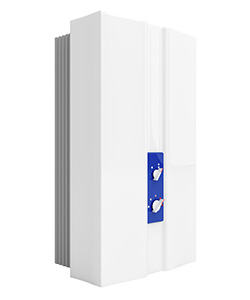Pros and Cons of Tankless Water Heaters
Date: April 7, 2017
ARTICLES
PROS AND CONS OF TANKLESS WATER HEATERS
APR 06, 2017
Tankless water heaters have been around for some time, though there is still much confusion about how they work and whether or not they are a good investment. Is a tankless water heater worth the extra upfront investment? The truth is, it depends. While households with tankless water heaters routinely save up to 20 percent on the cost to heat water in the home, the potential for energy savings depends on how the tankless water heater is used and the type of fuel source, among other factors. Read on for information to help you assess whether or not a tankless water heater would be a good addition to your household.
ABOUT TANKLESS WATER HEATERS
Tankless water heaters (which are also known as demand-type or instantaneous water heaters) are unique from their traditional counterparts in that they supply hot water as needed rather than storing hot water for use in a tank. For this reason, tankless water heaters can result in energy savings for some household, depending on how much hot water they use and how the household uses its hot water.
In tankless water heaters, when a hot water tap is turned on, cold water is moved through a pipe and into the unit where it is then warmed up via heating elements. This results in a constant supply of hot water and significant energy savings. This depends on if the tankless water heater is the correct size for the given home and not overwhelmed by inappropriately large demands on its flow rate (more on this later). Tankless water heaters, when installed properly, also last for approximately 5-10 years longer than other types of water heaters.
WHAT SIZE TANKLESS WATER HEATER DO I NEED?
Determining the appropriate size for your tankless water heater will depend on several factors. To be truly accurate in picking the most effective and efficient tankless water heater for your home, you should consult with a professional(and this consultation is a great time to get a quote on installation for maximum efficiency, anyway). However, with some simple calculations, you can get an idea of the size range you should consider when shopping for tankless water heaters.
First of all, consider the unit’s intended application. Are you using a tankless water heater to heat water in the whole house? Perhaps, just for a remote bathroom instead? Once you have that information, you will determine the necessary flow rate. For example, if you would potentially need hot water simultaneously delivered to a dishwasher with a flow rate of one gallon per minute, a shower head with a flow rate of two gallons per minute and a clothes washer with a flow rate of 0.25 gallons per minute, your total necessary flow rate will be the sum total, 3.25 gallons per minute.
Next, you will need to determine the necessary temperature rise. This is fairly simple. You need to have two pieces of information; the incoming water temperature and the desired output water temperature. The difference between the two will give you the necessary temperature rise. For example, if the incoming water temperature is 60 degrees Fahrenheit (a likely average when the weather is warm in the Phoenix area), and your desired output water temperature is 120 degrees Fahrenheit, you would need a tankless water heater that produces a temperature rise of 60 degrees Fahrenheit.
Taking the two above scenarios would mean that in total, you would need a tankless water heater that will produce a temperature rise of 60 degrees Fahrenheit with a flow rate of 3.25 gallons per minute. You will find that the 3.25 gallons per minute tankless water heater will be insufficient if, for example, a second shower is running at the same time as the other shower and appliances listed in our example because then the demand on the flow rate would become 5.25 gallons per minute. For this reason, some people opt to install multiple tankless water heaters, particularly if they have large families or unusual hot water consumption needs.
GAS OR ELECTRIC TANKLESS WATER HEATER?
Much like the traditional tank water heaters, tankless water heaters can be gas- or electric-powered. So how do you choose which fuel type to purchase? Well, first of all, you may not have much of a choice. Some housing developments do not have gas lines running to them, which means electric is your only option. However, let’s say you have the option to for gas or electric.
Gas tankless heaters are much more efficient than gas tank heaters but still lag behind electric tankless heaters. Gas heaters tend to be around 85 percent efficient, while electric heaters can range up to 98 percent efficient. Then there is the initial startup cost. Gas heaters can be
anywhere from 50 to 100 percent MORE expensive than their electric counterparts. But, gas heaters are generally less expensive in terms of ongoing operating costs, usually ranging from 10 to 15 percent cheaper.
You also need to consider the space you have for the heater. Gas heaters need proper ventilation to exhaust fumes, while electric heaters don’t because, well there aren’t any fumes to worry about. Electric heaters tend to be a bit smaller as well, making it easier to locate them closer to the point of use.
A tankless water heater can be a great investment for your home if you’re looking for long-term energy savings. For more information about tankless water heaters, or to get an estimate for installation contact us today!

